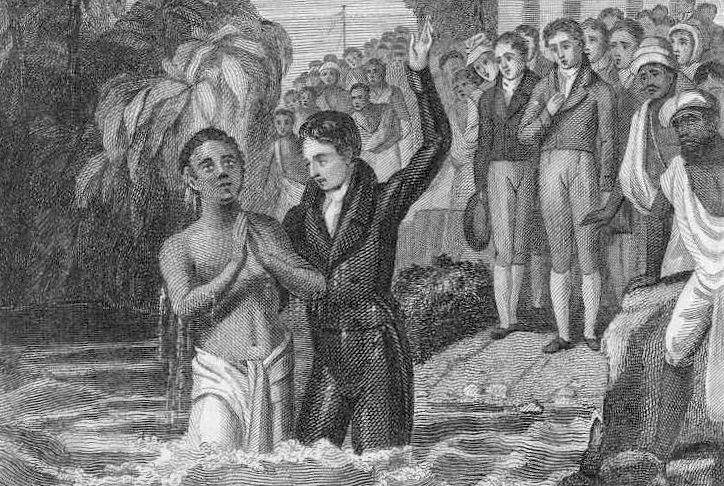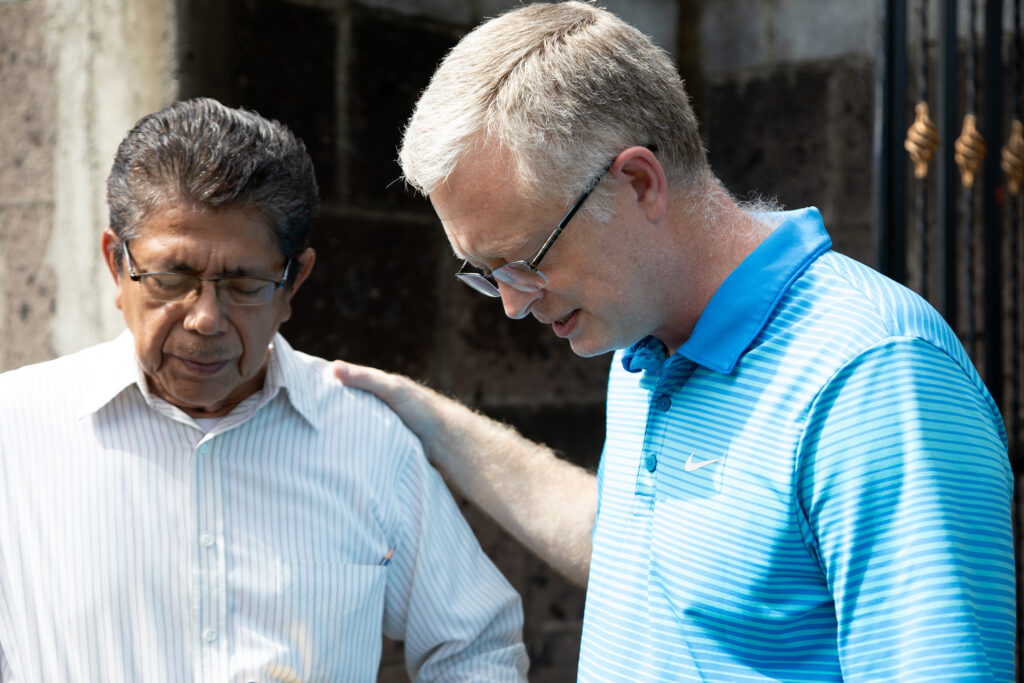If so, perhaps you should look more closely into the history of missions, where for centuries men and women have sought to carefully define both the task(s) of missions and how individual Christians can best fit in to the global ministry of the church.
For example, consider the 200-year-old “Form of Agreement,” a document adopted by a group of British Calvinist Baptist missionaries in Serampore, India on October 5, 1805. This “Form of Agreement” (henceforth: SFA) was composed by a man named William Ward1 and signed by William Carey (d. 1834), Joshua Marshman (d. 1837), and Ward himself (d. 1823).
The “Serampore Trio” shared a decades-long partnership in pioneering Bible translation, evangelism, church planting, and social reform.2 With six other missionaries, they put forth eleven “great principles” to explain their commitments and aims.3 The document’s brief introduction asserts that “The Redeemer” had “imposed” upon its signers “the cultivation of peculiar qualifications” for their “great and solemn work” as disciple-makers among Hindu and Muslim peoples.
In contrast to current faddish pragmatic strategies devoid of ecclesiology, the SFA articulates a biblical and holistic understanding of the missionary life and ministry. Below I will highlight four of its valuable insights.
1. Missionaries should evangelize out of compassion and urgency.
The SFA lays out three principles regarding the missionary’s view of and approach to evangelism. The first principle states it is “absolutely necessary” that missionaries “set an infinite value upon immortal souls.” They should “often endeavour to affect [their] minds with the dreadful loss sustained by an unconverted soul launched into eternity.” Readers are humbly reminded that just as God had in the past raised the “sottish and brutalised Britons” to sit in the heavenly places with Christ, he is able likewise to convert the souls of Indians steeped in superstition and brutal practices like widow burning (sati).4 Sympathy for the sore condition―both temporal and eternal―of lost people should compel the missionary to evangelistic diligence.
Missionaries should also evangelize with urgency. In fact, the SFA’s second principle urges evangelistic conversation “nearly every hour,” seeking opportunities “in season and out of season,” while the fifth specifies what must be the “great subject” of evangelistic preaching, teaching, and conversation: “Christ the crucified.” An awareness of the cross-cultural evangelist’s own limitations and weaknesses are displayed in the admission that “it would be very easy” to teach many true things for years on end, but apart from the explicit gospel as the point of it all, there would be no “well-grounded hope of becoming useful to one soul.”
The SFA states that it’s a missionary’s “bounden duty” to learn the languages of the people he or she aims to evangelize and disciple. A primary reason for this is “the general diffusion of the knowledge of Christ depends upon a liberal and constant distribution of the Word.”
2. Missionaries should contextualize to avoid cultural offense and gain confidence.
Three principles in the SFA concern what many today call “contextualization.” These early members of the British Baptist Missionary Society knew that Indians perceived them and other Europeans as “barbarians,” especially when they behaved in a manner ignorant of local customs and worldview. The document states it is therefore “very important” to learn everything possible about Indian “modes of thinking, their habits, their propensities, their antipathies, the way in which they reason about God, sin, holiness, the way of salvation, and a future state.”
The SFA also calls for the missionary necessity to abstain from whatever would increase the prejudices of Hindus against the gospel: “Those parts of English manners which are most offensive to them should be kept out of sight as much as possible.” The SFA appeals here to apostolic precedent, alluding to 1 Corinthians 9:19–23, 10:23–33, and Romans 14.
Finally, the document states, “It is absolutely necessary that the natives should have an entire confidence in us, and feel quite at home in our company.” To achieve this, “we must on all occasions be willing to hear their complaints; we must give them the kindest advice, and we must decide upon everything brought before us in the most open, upright, and impartial manner.” For this to occur, missionaries should be “easy to access” and “on all occasions” treat locals as equals.
3. Missionaries should aim to gather converts into faithful indigenous churches.
The document also addresses discipling converts and forming new congregations, making clear the missionary’s job involves more than mere evangelism, culture learning, and cross-cultural friendship.
Another important part of our work is to build up, and to watch over, the souls that may be gathered. In this work we shall do well to simplify our first instructions as much as possible, and to press the great principles of the gospel upon the minds of the converts till they be thoroughly settled and grounded in the foundation of their hope towards God.
The SFA advises both frequent time with converts and patience: “We must have much patience with them, though they may grow very slowly in divine knowledge.” Missionaries should remember that newer Christians have only recently learned “just and adequate ideas of the evil of sin, or its consequences,” and a “relapsed convert” shouldn’t be “cast away” even after “many falls.” The principle of meeting people where they are was as much a core operating value for this Serampore crew as it is for cross-cultural workers today.
The SFA deals directly with the formation of new congregations and the development of indigenous leadership: “Another part of our work is the forming [of] our native brethren to usefulness, fostering every kind of genius, and cherishing every gift and grace in them. In this respect we can scarcely be too lavish of our attention to their improvement.” The Serampore crew apparently knew that church planters are to function as temporary teachers and overseers, much like Paul and then Timothy in Ephesus, training the next generation of faithful elders in the good deposit of biblical doctrine (2 Tim. 2:2).
This point also astutely identifies the various reasons local believers are preferable to Europeans as evangelists and missionaries in India. Many of the negative reasons are still echoed today: “European” missionaries are too few and too expensive to maintain; becoming fluent in Indian languages is too difficult; “not to say anything of the prejudices of the natives against the very presence of Europeans.” Yet the SFA also offers positive reasons, and each of them echoes our contemporary call for more missionaries to be sent from majority world churches. In short, the cultural distance they must cross is far less than the Westerner’s.
Because of this, the advantages are “so evident,” says the SFA, that God’s raising of this native force should remain a constant concern of prayer. These future Indian evangelists and missionaries were envisioned as sent forth and supported by a network of numerous indigenous churches established by missionaries.
[W]e think it our duty as soon as possible, to advise the native brethren who may be formed into separate churches, to choose their pastors and deacons from amongst their own countrymen, that the word may be statedly preached, and the ordinances of Christ administered in each church by the native minister, as much as possible, without the interference of the missionary of the district…by which means the inhabitants will more readily identify the cause as belonging to their own nation, and their prejudices at falling into the hands of Europeans will entirely vanish.
Decades before the idea of a “three-self” church (self-governing, self-funding, self-propagating) was popularized, the SFA set forth such a goal. The long-range goals were simple: Indian churches of “permanent establishment” that would survive and thrive after the missionary efforts of Europeans had failed or became no longer necessary.5
On this point, the SFA reads, “These churches will be in no immediate danger of falling into errors or disorders, because the whole of their affairs will be constantly superintended by a European missionary.” The proper balance of supervision without undue interference was the goal. Problematic, though, is the fact that the SFA omits any explicit reference to a time when this missionary supervision may terminate.
4. Missionaries must give sacrificially of themselves.
Finally, the SFA states the need for missionaries’ personal sacrifice and holiness. Prayerfulness and “the cultivation of personal religion” are necessary to make missionaries fit for the “unutterably important labours” surveyed throughout the document. Individual and corporate prayer is called for, as well as a fervent “wrestling with God” that he might “famish these idols and cause the heathen to experience the blessedness that is in Christ.”
The final principle of the SFA exhorts all signers to glorify God with their “bodies and spirits, which are [God’s].” It begins, “Let us give ourselves up unreservedly to this glorious cause. Let us never think that our time, our gifts, our strength, our families, or even the clothes we wear, are our own. Let us sanctify them all to God and his cause.”
Church planters among unreached people groups have seldom seen much return on their own labors in their lifetimes. More frequently, they’ve tilled the ground and sown gospel seed in faith, passing on the baton to a few converts before planting their own bodies in the ground. Whether you’re engaged in cross-cultural ministry now or preparing to in the future, you would do well to consider the Serampore Form of Agreement. The same is true for those who will equip and shepherd future missionaries. The SFA’s eleven “great principles” set forth a biblical, realistic, and hopeful long-term vision for the life and labors that God might use in frontier missions.
Editor’s Note: This article was originally published on 9Marks October 25, 2016, and was adapted from an article from the Journal of Global Christianity. Used with permission.
1. I have consulted the “Form of Agreement” as found online in “The Serampore Form of Agreement,” Baptist Quarterly 12/5 (1947): 125-38. For William Ward as author of the SFA, see A. Christopher Smith, “The Legacy of William Ward and Joshua and Hannah Marshman,” International Bulletin of Missionary Research (1999): 125-26.
2. Ward and the Marshman joined Carey in 1799 (Smith, “Legacy,” 120). Ward had been a newspaper editor and social reformer in Britain both before and after his conversion.
3. Brian Stanley called the SFA the “covenantal basis for the Serampore mission community” in his article, “Planting Self-Governing Churches: British Baptist Ecclessiology in the Missionary Context,” Baptist Quarterly 34/8 (1992): 379.
4. Widow burning is just one example of a social injustice opposed by Carey and other BMS missionaries.
5. One way Carey tried to motivate his British audience to missionary labors and support of them was by imagining a day when they themselves could be edified by the peculiar contributions of Christian writers from a variety of contexts that were yet unreached and untaught (Myers, “Tracing a Theology of the Kingdom of God,” 43 [citing Carey’s Enquiry, 69-70]).





